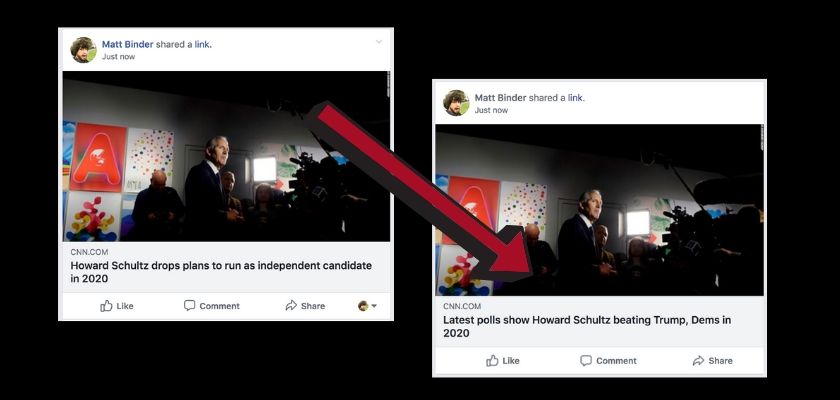Back in 2017, Facebook changed the rules on link-sharing on the platform. Before that summer, anyone who shared an article on Facebook could easily edit the title of the article before posting it.
For example, take this article from Fox News. The title is “Kirstie Alley calls out Hollywood ‘yahoos’ for shunning Trump supporters”. However, when posting this article to Facebook, Facebook used to let users change the title to something of their choosing. Studies show that many people on Facebook don’t actually read the articles shared there, they just read the title and hit “Like” or comment. So, users were able to change the meaning and even the influence of an article by changing the title.
The feature was a useful for Facebook page owners as it allowed them to shorten titles if they were too long for the platform or try out different headlines to see which would improve the click-through rate with their audience.
However, the issue was that people were using it to change the meaning and context of original news articles.
The Fox News article, for example, could be changed to “Kirstie Alley praises Hollywood for shunning Trump supporters” – and, if you didn’t click through to the actual article you’d never have known that the title had been altered.
After the cries of “fake news” and paranoia that spread around the internet after the 2016 election, the media were calling on Facebook to change the rules and prevent people from spreading fake news by altering the meaning of articles before posting.
In the summer of 2017, Facebook made the change, meaning that, when sharing an article online, the social giant would only show the title of the article the news outlet chose and prevented it from being modified.
“By removing the ability to customize link metadata (i.e. headline, description, image) from all link sharing entry points on Facebook, we are eliminating a channel that has been abused to post false news,” said Facebook in 2017.
Under the new changes, only users that own a website could apply for the ability to edit the title and metadata of their own articles.
However, a newly-discovered bug on the Facebook platform has shown that it’s actually still easy to change the title of news articles.
Matt Binder, writing in Mashable came across a Facebook Group where a user shared a glitch that allowed anyone to change the title of any article posted to Facebook.
“If I am posting something from Mashable from a Facebook Page about how important vaccines are,” the user explained to Binder. “I could now change the headline to say ‘New Report Finds Vaccines Are Bogus.’”
After writing to Facebook about the issue, the user was met with the usual canned response:
“I reported it to [Facebook] a few months back,” the source wrote to me more than three weeks ago. “I reported it again not too long ago and two days ago they responded with an automated reply and closed the ticket.”
Ten days later, Facebook replied.
“We received your report and appreciate your patience as we work to fix technical problems on Facebook,” the company said. “Though we can’t update everyone who submits a report, we’re using your feedback to improve the Facebook experience for everyone.”
Binder was able to use a loophole to produce the following result:

There are at least two loopholes that we know of that allow you to edit the title of any article that you post to Facebook and, while many might agree that the trouble with “fake news” comes from the news media itself and not headlines, it appears that Facebook’s anti-fake news department has missed some of the basics.
A meeting about fake news and misinformation recently took place between tech giants and federal officials at Facebook’s headquarters this week.
We can confirm that least two loopholes are currently in existence at the publication of this article.












